

Tao Te Ching
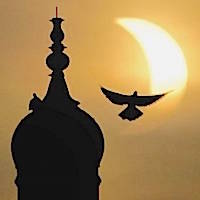
Sufi Lineage
People (13)

Zainab, Sayyeda Zaynab bint Ali زينب بنت علي
626 – 681 CE
Grand-daughter of the Prophet Muhammad, daughter of revered leader Ali ibn Abi Talib (regarded by Shia as the most important figure after Muhammad, by Sunnis as the greatest warrior champion of Islam, and by Sufis as the originator of their lineage; his legacy split Islam into Shia and Sunni), effective political leader, and one of the most admirable people in early Islam; Zainab - famous for her wisdom, strength and patience - is a rare instance of reverence for both Sunnis and Shi’as. Called the "Hero of Karbala,” she endured physical pain and mental torture to stand up against tyranny, speak the truth, and set Islam on a more just and compassionate course. In Iran today her birthday is known as Nurse's Day.
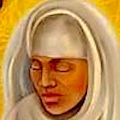
Rabia Basri رابعة العدوية القيسية (Rābi‘a al-‘Adawīyya)
714 – 801 CE
Muslim mystic, “queen of saintly women,” and most important early Sufi poet; Rabia Basri rose from the poverty and slavery of her youth to become the most famous and influential Sufi woman of Islamic history known as “the queen of saintly women.” She had many disciples and became an important influence on the leaders of her time as well as an early voice against spiritual materialism and Islamic patriarchy. She taught a doctrin of Divine Love known as Ishq-e-Haqeeqi that is still practiced today and emphasized spiritual practice without desire for reward or fear of punishment.
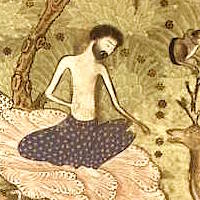
Abu Yazid al-Bisṭāmī بایزید بسطامی
804 – 874 CE
Famous Sufi, ”King of the Gnostics,” forefather of ecstatic Islamic mysticism; Abu Yazid disavowed excessive asceticism and changed the course of Sufism by shifting the emphasis from discipline, obedience and piety to direct experience and “self-annihilation in the Divine Presence.” An active shrine to him in Bangladesh was built and has been used since 850 CE and he remains an important lineage holder in thelargest Sufi brotherhood, the Naqshbandi.
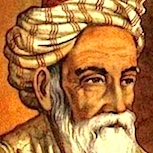
Omar Khayyám
1048 – 1131 CE
Persian Astronomer-Poet, prophet of the here and now
In the west most famous for his poems but Omar Khayyam was also a political advisor, “philosopher of the world,” one of the most influential scientists of his era, “one of the greatest mathematicians of medieval times,” and “without equal in astronomy and philosophy.” A prophet of the here and now, mystical Sufi teacher and free-thinker who rejected theology; he reformed the Persian calendar to a form more accurate than our own today, wrote the most important until modern times book on algebra as well as many others on astronomy, geography, and mechanics. His poems—known as the Rubáiyát—not only rejected Islamic belief and Christian morality, but the nature of religion itself.
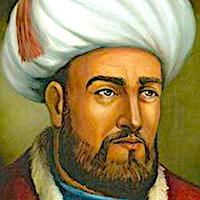
Al-Ghazali أبو حامد محمد بن محمد الطوسي الغزالي (Abu Hamid Al-Ghazali)
1058 – 1111 CE
Philosopher of Sufism
Legal and theological scholar, rationalist, spiritual philosopher, and Sunni mystic; Al-Ghazali became known as a Mujaddid, a once-in-a-century Muslim "renewer of the faith." Believing that the original Islamic teaching quickly became corrupted, he worked to bring the original wisdom back into awareness and—as a side-effect—brought a critique of the Aristotelian approach that facilitated the advancement of European science. He helped integrate Sufism into mainstream Islam and his teaching became a profound influence and foundation for Islamic business ethics and practice.

Ibn' Arabi Ibn 'Arabi
1165 – 1240 CE
“the foremost spiritual leader in Muslim history”
Islamic Scholar, Sufi mystic, poet, philosopher and genuine saint; Ibn ‘Arabi was born during and at the center of a time and place where Christian, Jewish, and Islamic thought were cross-pollinating with a rediscovery of ancient Greek and Roman wisdom. In over 350 literary works including some of the finest poetry in the Arabic language, he influenced Islam away from rigid orthodoxy toward a universal understanding that appreciates each person’s unique and personal spiritual path above doctrine and belief. A polarizing figure in Muslim culture, he’s known as either “the foremost spiritual leader and Sufi master in Muslim history” or as a heretic and apostate.

Rumi مولانا جلالالدین محمد بلخی (Rumi Mawlānā Jalāl ad-Dīn Muḥammad Balkhī)
1207 – 1283 CE
Sufi mystic, Afghan hero, Sunni scholar-theologian, and one of the most widely read poets in the United States; Rumi went beyond religious, cultural, and ethnic borders to become a bridge between Shia and Sunni Muslims, East and West, between many of the world’s religions and cultures. Always a strong voice for peace, harmony, and understanding; he composed what’s considered the greatest poem written in the Persian language. While fleeing from a Mongol invasion with his family and during later journeys, he encountered many poetic and spiritual influences that transformed his conventional life of a scholar and jurist into an ascetic teacher who used music, poetry and dance to communicate the highest wisdom.
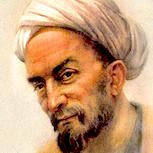
Saadi Shiraz سعدی شیرازی
1210 – 1292 CE
One of the greatest Persian poets and literary influences in medieval times and an influence on the West through people like Goethe, Hegel, Pushkin, and Barack Obama; Saadi - with a Zen-like approach similar to the great Tibetan teacher, Marpa - blended a mystical Sufi realization with a practical traveling merchant lifestyle. Escaping the hardship and poverty of his Baghdad youth, he traveled widely for 30 years including 7 years of imprisonment enslaved to hard labor. He then wandered 20 more years during the Mongol invasions mingling with ordinary people, bandits, refugees, spiritual teachers and farmers translating their experiences into poetry and wisdom teachings.
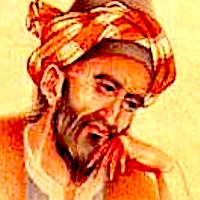
Hafiz خواجه شمسالدین محمد حافظ شیرازی (Hafez, Shams-ud-Dīn Muḥammad)
1315 – 1394 CE
Inspiring friend to the true and free human spirit
Mystic poet, “tongue of the invisible,” living oracle, “a poet for poets,” one of the world’s best spiritual friends and guides; Hafiz wrote poems that dissolve the walls separating people from each other, from nature, and from sacred awareness. For centuries readers in the Persian world have used him as a kind of I Ching or astrology to find practical, personal, and wise advice for the quandaries of daily life. Even Queen Victoria is rumored to have used his poems in this way. Although a Sufi in the Islamic traditions, Hafiz obviously goes far beyond and kind of sectarian fixation and exposes a true realization of universal truth, the perennial philosophy, and authentic, sacred-world living.

Inayat Khan
1882 – 1927 CE
Grandson of famous musician and “Beethoven of India,” Ustad Maula Bakhsh and married to the cousin of Christian Science founder Mary Baker Eddy; Inayat Khan joined together esoteric mysticism with the magic of music and brought Sufism to the West. He warned against any blind belief systems and inspired visions of beauty, harmony and love. He taught that nature is the only holy book, self-realization the only truth, “unswerving progress in the right direction” the only religion, and all the children of earth our only true family. He traveled widely spreading his vision of seeing through the identifications separating people and harmonizing the East and the West.

Kahlil Gibran
1883 – 1931 CE
After Shakespeare and Laozi, Gibran is the third best-selling poet of all time. His friends included WB Yeats, Carl Jung and Auguste Rodin. Elvis Presley was deeply influenced by Gibran, read passages to his mother, made notes in the margins, and gave away copies of The Prophet to his friends. Johnny Cash was also a big fan and John Lennon adapted lines from his poetry into his songs.
{Maronite Christian, Bahá’í, Sufi}
The Prophet, Sand and Foam, The Earth Gods, The Broken Wings, Love Letters in the Sand.
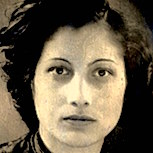
Noor Inayat Khan
1914 – 1944 CE
Daughter of the famous musician and teacher, Hazrat Inayat Khan who brought Sufism to the West; Noor was a skilled musician, studied medicine, and wrote children’s books. She became a hero to allied forces fighting against Nazi Germany in WWII and was given the George Cross, one of Britain's highest awards for bravery as well as a French Croix de Guerre. She followed her father’s teachings on non-violence but because of Hitler’s threat to Europe joined the British Air Force and then a secret British espionage group. She was the first woman spy to infiltrate occupied France and was later betrayed, captured, refused to cooperate or give information and was executed in a concentration camp.
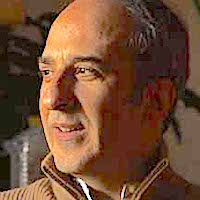
Peter Kingsley
1953 CE –
Sufi, mystic, author, philosopher, scholar; Kingsley describes a "flowering of consciousness” and the birth/beginning of western civilization during the pre-Socratic Greek period based on the influence of Parmenides and Empedocles. He describes Parmenides' nameless goddess who uses words as esoteric seeds and paradoxical divine logic to reveal unity and reality’s oneness. These seminal Orphic and Pythagorean views later distorted by Plato and Aristotle show remarkable similarities to early Buddhist, Taoist, and shamanistic traditions; modern Vedanta, Zen, and Dzogchen.
Related Sources (0 sources)
Quotes about the Sufi Lineage (2 quotes)

“Mohammedanism, like Christianity, was a developing and adjustable religion which would have startled a reborn Mohammed or Christ... Sufi devotees abandoned family life, lived in religious fraternities under a master, and called themselves dervish (mendicants). Some by prayer and meditation, some by ascetic self-denial, others in the exhaustion that followed wild dancing, sought to transcend the self and rise to a wonder-working unity with God.”
Comments: Click to comment
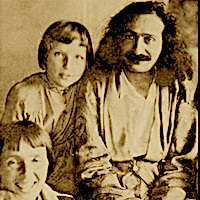
“In the West, Sufism is usually regarded as a form of Islamic mysticism. However, the Sufis themselves say their 'way' has always existed, under many names, in many lands, associated with the mystical dimension of every spiritual system.”
Comments: Click to comment
Comments (0)